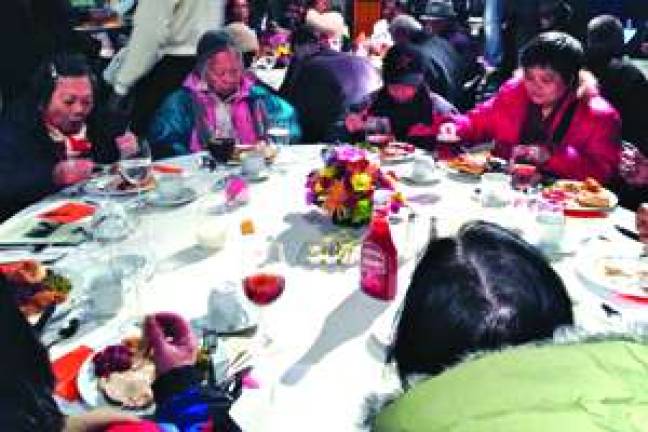Canal Street Mission Continues to Serve

Despite a setback from Hurricane Sandy, the historic shelter looks ahead to a new facility and a robust Thanksgiving By Sophia Rosenbaum The New York City Rescue Mission has a lot to be thankful for post-Sandy. "It's a little bit of a hardship to be blocks away from the worst of it," said Joe Little, the mission's director of community relations. "But, we were able to sustain some continuity for four or five days while being in the middle of mild-mannered chaos." While the mission lost power for four days, they continued to feed hundreds of people, including what Little calls the "perennial homeless" and the "temporarily homeless." The mission, which is tucked behind a construction project just south of Canal Street, helps those who have slipped between society's cracks to find refuge, offer a meal on their plate and a bed to sleep in at night-24 hours a day, seven days a week. "It's a sanctuary of hope," said Martin Bowman, a reformed cocaine addict who now greets anyone who walks through the doors with a smile as the mission's front desk supervisor. "It challenges your worldview and hopefully starts people on a path to transformation." Bowman, who has been affiliated with the mission for 12 years, is just one of their many success stories. Lost in a sea of scaffolding, the mission is getting a top-to-bottom makeover. With long sheets of plastic serving as makeshift doors and the resonating sound of drills and hammers, Bowman said he's eagerly awaiting the new six-story building, which is still on track to be complete in early 2014 despite the setback from Sandy. Many New Yorkers in dire straits can't welcome the new construction soon enough. Statistics from the 2011 Census Bureau detail a rising poverty rate in New York City, which is currently at 20.9 percent, up nearly one percentage point from last year. In raw numbers, that means close to 1.7 million people fall below the poverty level of $22,811 for a family of four in New York City. Rising poverty paired with our current national economic crisis translates to more people out of work, out of money and out of a place to live. For the mission, this means more people to help. Packaged as a soup kitchen, a pantry and a shelter, the mission offers a variety of 24/7 services, from three meals a day to overnight lodging to counseling, and men-only 12-step programs for recovering alcoholics and drug addicts. Harry Benjamin, 58, has been coming to the food pantry for years because he and his wife do not bring in enough money to support his two children. "I come here to eat," Bejamin said, "so that I can have enough food before my next check comes." Bowman said all the security guards who work with Benjamin come to the mission for pantry packages to sustain their families. From 2 p.m. to 3:30 p.m., people arrive in spurts to claim two plastic bags stuffed with staples like rice, pasta, canned fruits and canned vegetables. Some unexpected treats like cookies and chocolate toffee also make their way into the bags through donations from Starbucks and other local bakeries. From July to September, over 900 people volunteered at the mission to help serve the 500 people they help a day, according to David Knoche, the mission's volunteer manager and administrative assistant. From spaghetti and meatballs to a full Thanksgiving meal, Knoche said numbers are up for those using soup-kitchen services for their daily meals since the 2008 recession. "It takes a village to make things happen," he said. While he may not look it in his professional attire of a purple button-up shirt and black slacks, Knoche is a recovered alcoholic and dope addict. He has been clean for over 30 years and attributes much of his success to God. The mission focuses on religious and spiritual guidance to help people escape drugs and homelessness. James Rowntree, 53, has been in the 12-step program for seven months, and is homeless, but not an addict. "I've got no family, no money, no place to live," he said in a British accent. "I believe that God wants me to be here." People at the mission like Rowntree break the mold of what most people think of when they hear the word "homeless." The same is true for Bowman. Although he was raised by a "solidly middle-class family," his egocentric tendencies eventually tied him in the drug scene. "My real addictions were power," he said. "I had no intention of helping the homeless at all," he added with a laugh. But, after the tables were turned and Bowman experienced first-hand what it was like to be homeless, he dedicated his life to helping those in need. "The real struggles in life are universal," he said. "If you're a homeless addict, we provide help. If you're a businessman, we provide help. This place does so much more than just provide people with a meal." Little said that despite minor setbacks from Sandy, they are still gearing up for their 14th annual Great Thanksgiving Banquet, where he expects at least 1,200 people-up 200 people from 2011. "We have a bigger space this year for the celebration," he said. "So we think it will be bigger this year. Also, I think no matter what your socioeconomic status is, people are very aware of the plight of the homeless right now because of Sandy."